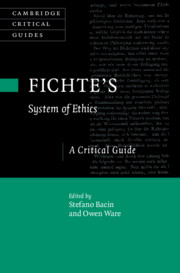Book contents
- Fichte’s System of Ethics
- Cambridge Critical Guides
- Fichte’s System of Ethics
- Copyright page
- Contents
- Contributors
- Acknowledgments
- Abbreviations and Translations
- Introduction
- Chapter 1 Fichte’s Ethics as Kantian Ethics
- Chapter 2 Fichte on Normativity in the Late Jena Period (1796–1799)
- Chapter 3 Fichte on Autonomy
- Chapter 4 Feeling, Drive, and the Lower Capacity of Desire
- Chapter 5 Fichte and the Path from “Formal” to “Material” Freedom
- Chapter 6 Fichte on the Content of Conscience
- Chapter 7 Fichte’s Theory of Moral Evil
- Chapter 8 Embodiment and Freedom
- Chapter 9 Ethics as Theory of Society
- Chapter 10 My Duties and the Morality of Others
- Bibliography
- Index
- Cambridge Critical Guides
Chapter 10 - My Duties and the Morality of Others
Lying, Truth, and the Good Example in Fichte’s Normative Perfectionism
Published online by Cambridge University Press: 20 May 2021
- Fichte’s System of Ethics
- Cambridge Critical Guides
- Fichte’s System of Ethics
- Copyright page
- Contents
- Contributors
- Acknowledgments
- Abbreviations and Translations
- Introduction
- Chapter 1 Fichte’s Ethics as Kantian Ethics
- Chapter 2 Fichte on Normativity in the Late Jena Period (1796–1799)
- Chapter 3 Fichte on Autonomy
- Chapter 4 Feeling, Drive, and the Lower Capacity of Desire
- Chapter 5 Fichte and the Path from “Formal” to “Material” Freedom
- Chapter 6 Fichte on the Content of Conscience
- Chapter 7 Fichte’s Theory of Moral Evil
- Chapter 8 Embodiment and Freedom
- Chapter 9 Ethics as Theory of Society
- Chapter 10 My Duties and the Morality of Others
- Bibliography
- Index
- Cambridge Critical Guides
Summary
The aim of the chapter is to shed light on some of the most original elements of Fichte’s conception of morality as expressed in his account of specific obligations. After some remarks on Fichte’s original classification of ethical duties, the chapter focuses on the prohibition of lying, the duty to communicate our true knowledge, and the duty to set a good example. Fichte’s account of those duties not only goes beyond the mere justification of universally acknowledged demands, but also deploys different arguments than his contemporaries, most notably Kant. Fichte thereby sketches a conception of morality in which the agent is crucially required to contribute to the morality of others. The chapter explores the contrast between Fichte’s view and Kant’s thought of an end in itself and suggests that Fichte’s view of morality amounts to a form of normative perfectionism that is qualified by the underlying claim of the agent-neutral character of moral demands.
- Type
- Chapter
- Information
- Fichte's System of EthicsA Critical Guide, pp. 201 - 220Publisher: Cambridge University PressPrint publication year: 2021
- 5
- Cited by

